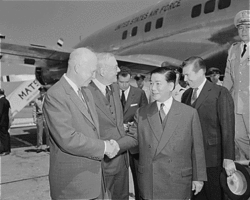11.02
On this date in 1963, South Vietnamese President Ngo Dinh Diem and his brother are captured and killed by a group of soldiers. The death of Diem caused celebration among many people in South Vietnam, but also leads to political chaos in the nation. The United States subsequently became more heavily involved in Vietnam as it tried to stabilize the South Vietnamese government and beat back the communist rebels that were becoming an increasingly powerful threat. While the United States publicly disclaimed any knowledge of or participation in the planning of the coup that overthrew Diem, it was later revealed that American officials met with the generals who organized the plot and gave them encouragement to go through with their plans. Quite simply, Diem was perceived as an impediment to the accomplishment of U.S. goals in Southeast Asia. His increasingly dictatorial rule only succeeded in alienating most of the South Vietnamese people, and his brutal repression of protests led by Buddhist monks during the summer of 1963 convinced many American officials that the time had come for Diem to go. Three weeks later, an assassin shot President Kennedy. By then, the United States was more heavily involved in the South Vietnamese quagmire than ever. Its participation in the overthrow of the Diem regime signaled a growing impatience with South Vietnamese management of the war. From this point on, the United States moved step by step to become more directly and heavily involved in the fight against the communist rebels.












